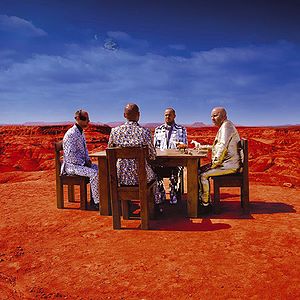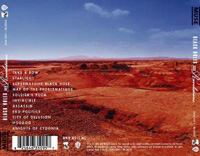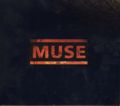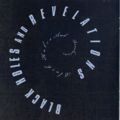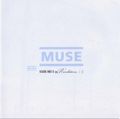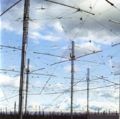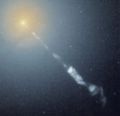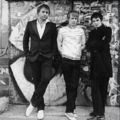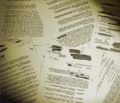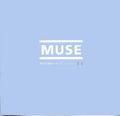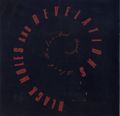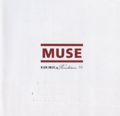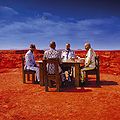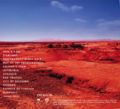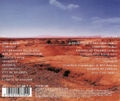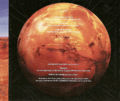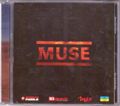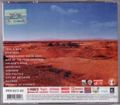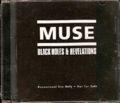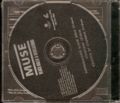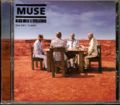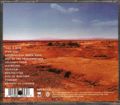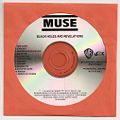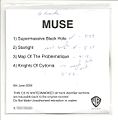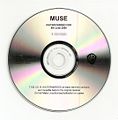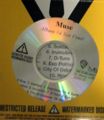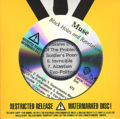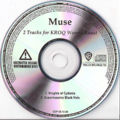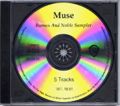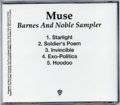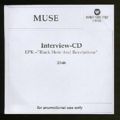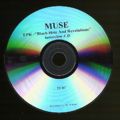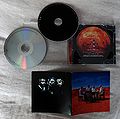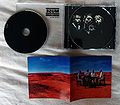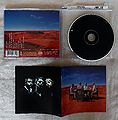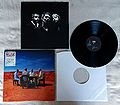Difference between revisions of "Black Holes and Revelations (album)"
(→Recording: Bowie present) |
|||
| (44 intermediate revisions by 9 users not shown) | |||
| Line 68: | Line 68: | ||
| Next = The Resistance | | Next = The Resistance | ||
| NextLink = The Resistance (album) | | NextLink = The Resistance (album) | ||
| single1 = Supermassive Black Hole | image1 = | | single1 = Supermassive Black Hole | image1 = Supermassive_Black_Hole.jpg | ||
| single2 = Starlight | image2 = | | single2 = Starlight | image2 = Starlight_CD.jpg | ||
| single3 = Knights of Cydonia | image3 = | | single3 = Knights of Cydonia | image3 = Koccds.png | ||
| single4 = Invincible | image4 = | | single4 = Invincible | image4 = Invincible.jpg | ||
| single5 = Map of the Problematique | image5 = | | single5 = Map of the Problematique | image5 = Map_Of_The_Problematique.jpg | ||
| Type = album | | Type = album | ||
| singlescount = 5 | | singlescount = 5 | ||
}} | }} | ||
<br/> | <br/> | ||
<br/> | <br/> | ||
| Line 87: | Line 87: | ||
title=Muse reveal inspiration behind funky new sound | desc=NME news | date=2006-07-19 | url=http://www.nme.com/news/muse/23652 | dom=nme.com |type=ext | title=Muse reveal inspiration behind funky new sound | desc=NME news | date=2006-07-19 | url=http://www.nme.com/news/muse/23652 | dom=nme.com |type=ext | ||
}}</ref> where Matt DJed in a club and the band recorded the remaining songs in the [[Electric Lady Studios]].<ref name="eq200703"/> | }}</ref> where Matt DJed in a club and the band recorded the remaining songs in the [[Electric Lady Studios]].<ref name="eq200703"/> | ||
The general theme of the album centres on dystopian-orientated/kleptocratic politics, along with accompanying war and about cycles and big things happening: "There is a theme on the album, it's that kind of connection to the cycles of history where the tension builds up and then it's released, whether it's catastrophic like a nuclear war, or aliens come down and it's brilliant. But there's definitely a sense of something big is about to happen." and that "Some of the songs are directly informed by things that are going on at the moment"<ref>{{cite/nme20060315}}</ref> Matt also said in another interview: " It [The 50's] was an era of worldwide tension, of nuclear fear and of war. Today, we’ve come back to this feeling, like at the end of a cycle. There’s even been a rise in the interest in space. This theme, the connection between current tensions and those from long ago, can really be heard on the album"<ref name="rockmag0507">{{cite/rm200605}}</ref> | |||
Matt said that the songs in the album are told from different person's Point Of View: "This time, it is a bit about struggling with various contrarities of life, but from a different person's view, not from mine. It is about the fear of who or what is ruling the world. It is about trust and about not losing track in this tangle. Maybe it is about a person struggling his way through this chaos."<ref name=INTROMagazine2007"> | |||
{{cite | | |||
title=INTRO Magazine online article| desc=Interview| date=2007 | auth=INTRO Magazin| url=http://www.intro.de/popmusik/muse-13) | dom=INTRO | fetch=2015-01-16 | type=ext | |||
}}</ref> | |||
Matt described the album as: "About the album, some new songs deal with awol soldiers, Zeta Reticulans, the sound of Joe Meek's tape machine being thrown down the stairs, the private thoughts of General Zhu Chenghu, feeling strangely comfortable collecting fire wood whilst wielding an axe and of course, how to store Pasta for 12 years using nitrogen flushing. We have also obtained a Buchla. Our very own Marvin sat in the corner depressed too complex to be fun and too unreliable to be a friend. It may have been close to getting blood from a stone but in the end we did get some earnest synth dreams out of him. The 6/8 cycling monster has turned out truly gargantuan, it will have to end the album (a few beserkers may recognize the chordal structure from piano doodlings on previous tours). Also, a sinister presence at the center of our Galaxy has inspired what could be described as a surprisingly casual manage-a-trois involving Prince, R2-D2 and the Queen when she was hot"<ref> | |||
{{cite | | |||
title=Muse - Progress| desc=News | date=2006-02 | url=http://muse.mu/news,progress_720.htm | dom=muse.mu |type=ext | |||
}}</ref> | |||
The album is dedicated to the memory of [[Helen Kirk]].<ref name="albn"/> | The album is dedicated to the memory of [[Helen Kirk]].<ref name="albn"/> | ||
== Prior to recording == | == Prior to recording == | ||
Many songs from this album and its singles were already written before 2005. The earliest two, Take a Bow and Soldier's Poem, were ones that were attempted during the Absolution sessions; Take a Bow was played as an instrumental interlude at many 2003 and 2004 gigs. Both Glorious and Crying Shame, which would not make the final cut on the album, were played live in 2004. Knights of Cydonia was said to be written on the tour bus while in Arizona, a destination only toured in late 2004. Starlight was also stated to be written during the 2004 tour, although neither Starlight nor Knights of Cydonia would be performed during the Absolution tour. Additionally, City of Delusion was cited as the oldest song on the album by Rich Costey, indicating bits and pieces may have even been written on the Origin of Symmetry tour or sessions. | |||
Playing of the tracks started mid-2004 with "[[Glorious (song)|Glorious]]". "[[Crying Shame (song)|Crying Shame]]" made its debut in [[London Earls Court Exhibition Centre 2004 - 19th (gig)|19 December 2004]], while "[[Assassin (song)|Assassin]]" and "[[Exo-Politics (song)|Exo-Politics]]" in their early forms made their debut during the 2005 MTV Campus Invasion Tour ([[Boca Raton Auditorium Field 2005 (gig)|8 April 2005]]).<ref name="eq200703"/> | |||
Matt Bellamy wrote five songs after he travelled to Kingdom of Bhutan and the Himalayas earlier in 2005: "I was in Bhutan, I wanted to get away from everything - no phone, no tv, nothing. I went checking out the monks, hiking up mountains...It was really good for clearing my mind of any distractions, I got five new songs written while I was out there, though that isn't why I went."<ref name=MicroCutsNet20050224"> | |||
{{cite | | |||
title=Five new songs, Matt in Bhutan | desc=Interview| date=2005-02-24 | auth=Micro Cuts net| url=http://www.microcuts.net/uk/news/archives/02242005-five_new_songs.php | dom=microcuts.net | fetch=2015-01-16 | type=ext | |||
}}</ref><ref name="rockmag0507">{{cite/rockmag200605}}</ref> It isn't known what surfaced from this session, although it is likely the songs from this session were among the many that were scrapped. | |||
Bellamy approached Costey in regards to producing their next album during the ''Absolution'' tour. Costey followed this up by contacting Bellamy a few months prior to starting the album.<ref name="eq200703">{{cite/eq200703}}</ref> The playing of ''Black Holes and Revelations'' tracks and its b-sides live in effect started in 2003 with "[[Take a Bow (song)|Take a Bow]]" being played as a piano interlude after "[[Citizen Erased (song)|Citizen Erased]]". | |||
== Recording == | == Recording == | ||
The album was written partly before the ''Absolution'' Tour, partly during said tour and finished during their time at [[Studio Miraval|Miraval Studio]], Avatar and [[Electric Lady Studios]]. As with ''Absolution'', the time frame was not as large a concern as on the former two albums, hence Muse took their time over recording the album. The freedom also extended into the style of the music they wrote, delving into areas that Muse considered might be risky for other bands | The album was written partly before the ''Absolution'' Tour, partly during said tour and finished during their time at [[Studio Miraval|Miraval Studio]], Avatar and [[Electric Lady Studios]]. As with ''Absolution'', the time frame was not as large a concern as on the former two albums, hence Muse took their time over recording the album. The freedom also extended into the style of the music they wrote, delving into areas that Muse considered might be risky for other bands,<ref name="ml20060315">{{cite | ||
[[Matthew Bellamy|Bellamy]]: We've got to a point where we're pretty much free to do whatever we like. It was difficult because we wanted every song to be different to what we've done before. I think we've managed to do that. With the range we've shown on previous albums, I think we've got the freedom to go into areas other bands would consider risky. Previously, we consciously thought about which songs would work live but this time we just went for it. We'll worry about how to play them live later. | |title=Muse featured in NME and Kerrang! | ||
|desc=Muselive.com news | |||
|date=2006-03-15 | |||
|auth=Tom | |||
|pub=MuseLive.com | |||
|dom=muselive.com | |||
|url=http://www.muselive.com/forums.php?m=posts&p=342446#342446 | |||
|type=ext | |||
}}</ref> | |||
[[Matthew Bellamy|Bellamy]] also said in the same interview: "We've got to a point where we're pretty much free to do whatever we like. It was difficult because we wanted every song to be different to what we've done before. I think we've managed to do that. With the range we've shown on previous albums, I think we've got the freedom to go into areas other bands would consider risky. Previously, we consciously thought about which songs would work live but this time we just went for it. We'll worry about how to play them live later". Muse previously had written songs with their ability to play them live in mind, the band did not concern themselves with this ability whilst recording ''Black Holes and Revelations''.<ref name="ml20060315"/> | |||
In September 2005, during the band's time at Miraval, the album was hindered by the band's fear of bats and ghosts, as well as the owner who purportedly didn't want Muse there, Matt: "The studio was set next to a vineyard and was full of ghosts. The owner was this moody old geezer who didn't seem to want us there and kept interrupting us when we were writing the album" and Chris added: "There were so many bats flying around the rehearsal room while we were trying to work" <ref name="ml20060315"/> Only two songs were recorded during Muse's time at Miraval, namely "Take a Bow" and "[[Invincible (song)|Invincible]]". | |||
In total, around 20 songs were recorded for the album <ref name="rockmag0507">{{cite/rm200605}}</ref>. Eleven of these made it to the final product, while three others became B-sides, with the others left unfinished or as demos.<ref name"answers">{{cite/museboard20081128}}</ref> One final leftover song, "[[Soaked (song)|Soaked]]", was completed during the end of the recording process, later emerged in the form of a leaked promo CD. This leaves around five unheard songs remaining, which roughly aligns with Chris’ supposition that they had enough songs left to potentially release an EP the following year, if they chose to. <ref name="ml20060601"> | |||
{{cite | | {{cite | | ||
title = Muse Interview In French Magazine | desc = MuseLive news item | date = 2006-06-01 | url = http://www.muselive.com/forums.php?m=posts&p=377026#377026 | auth=sam_linnett | dom=muselive.com | title = Muse Interview In French Magazine | desc = MuseLive news item | date = 2006-06-01 | url = http://www.muselive.com/forums.php?m=posts&p=377026#377026 | auth=sam_linnett | dom=muselive.com | ||
}}</ref> | }}</ref> | ||
Matthew Bellamy claimed that had the entire recording process been carried out at Miraval, it would have turned out akin to Pink Floyd's Dark Side of the Moon.{{cite/none}} He described some of the material that they put aside from their time at Miraval as "a little too progressive and symphonic" for the type of album they wanted ''Black Holes and Revelations'' to be,<ref name="jatd20070802">{{cite/The Breakfast Show 2007-08-02}}</ref> and "waffling on the piano, a lot of orchestration".<ref name="jatd20070802"/> The band had become frustrated during their time at Miraval at the "lack of rock" in their music.<ref name="jatd20070802"/> | Matthew Bellamy claimed that had the entire recording process been carried out at Miraval, it would have turned out akin to Pink Floyd's Dark Side of the Moon.{{cite/none}} He described some of the material that they put aside from their time at Miraval as "a little too progressive and symphonic" for the type of album they wanted ''Black Holes and Revelations'' to be,<ref name="jatd20070802">{{cite/The Breakfast Show 2007-08-02}}</ref> and "waffling on the piano, a lot of orchestration".<ref name="jatd20070802"/> The band had become frustrated during their time at Miraval at the "lack of rock" in their music.<ref name="jatd20070802"/>. | ||
In the Autumn 2005, Muse moved to New York, recording at Avatar and Electric Lady Studios. As well as recording in New York, Muse partook in the lifestyle of the city, which [[Dominic Howard]] claims influenced the style and direction of the album, particularly "[[Supermassive Black Hole (song)|Supermassive Black Hole]]".<ref name="mtvn">MTV News<!--Link or transcription needed!--></ref> The album's recording finished at Christmas 2005, after which the band moved to London and finished mixing at Sanctuary Townhouse Studios.{{cite/none}} <!--"When we moved into this crazy, claustrophobic, fast-paced way of living, we absorbed some of that energy and that affected the recording," [[Dominic Howard|Howard]] told MTV News-->Whilst recording the band worked on one song at a time, keeping those they liked and scrapping those they disliked.<ref>Chris Wolstenholme interview (needed)</ref> New instrumentation not used on previous recordings include a buchla synthesiser and a trumpet. | In the Autumn 2005, Muse moved to New York, recording at Avatar and Electric Lady Studios. As well as recording in New York, Muse partook in the lifestyle of the city, which [[Dominic Howard]] claims influenced the style and direction of the album, particularly "[[Supermassive Black Hole (song)|Supermassive Black Hole]]".<ref name="mtvn">MTV News<!--Link or transcription needed!--></ref> The album's recording finished at Christmas 2005, after which the band moved to London and finished mixing at Sanctuary Townhouse Studios.{{cite/none}} <!--"When we moved into this crazy, claustrophobic, fast-paced way of living, we absorbed some of that energy and that affected the recording," [[Dominic Howard|Howard]] told MTV News-->Whilst recording the band worked on one song at a time, keeping those they liked and scrapping those they disliked.<ref>Chris Wolstenholme interview (needed)</ref> New instrumentation not used on previous recordings include a buchla synthesiser and a trumpet. | ||
The track list of ''Black Holes and Revelations'' was finalised by April 2006,<ref> | David Bowie was present at the recording of both Take a Bow<ref>{{cite/eq200703}}</ref> and Invincible<ref>{{cite/thecouriermail20060824}}</ref>, the later, being of the like of Bowie and offered them to do a collaboration with him, however Matt felt he "wasn't ready" and thought of working both on Invincible, however Matt in the end "bottled out". The track list of ''Black Holes and Revelations'' was finalised by April 2006,<ref> | ||
{{cite | | {{cite | | ||
title = Album Details Emerge | desc = Muselive.com news | date=2006-04-23 | auth = RoyalBlue | url=http://www.muselive.com/forums.php?m=posts&p=343781#343781 | dom = muselive.com | type = ext | title = Album Details Emerge | desc = Muselive.com news | date=2006-04-23 | auth = RoyalBlue | url=http://www.muselive.com/forums.php?m=posts&p=343781#343781 | dom = muselive.com | type = ext | ||
| Line 117: | Line 149: | ||
Inspiration for the album was taken from a wide variety of other artists, from contemporary acts such as [[Lightning Bolt]]<ref name="eq200703"/> and [[Rage Against The Machine]],<ref name="rockmag0507">{{cite/rockmag200605}}</ref> to composer [[Ennio Morricone]]<ref>{{cite/undertheradar20060720}}</ref> and jazz singer [[Nina Simone]]. Muse also listened to music in the style of Joe Meek, Kill Bill and [[Nancy Sinatra]]. They had also been inspired by Belgian bands such as [[Millionaire]] and [[Evil Superstars]]. | Inspiration for the album was taken from a wide variety of other artists, from contemporary acts such as [[Lightning Bolt]]<ref name="eq200703"/> and [[Rage Against The Machine]],<ref name="rockmag0507">{{cite/rockmag200605}}</ref> to composer [[Ennio Morricone]]<ref>{{cite/undertheradar20060720}}</ref> and jazz singer [[Nina Simone]]. Muse also listened to music in the style of Joe Meek, Kill Bill and [[Nancy Sinatra]]. They had also been inspired by Belgian bands such as [[Millionaire]] and [[Evil Superstars]]. | ||
Bellamy also listened to the style of his father's band, [[The Tornadoes]]: My dad’s music which I'd never listened to before last year – before then, I'd found it uncool – really influenced me. | Bellamy also listened to the style of his father's band, [[The Tornadoes]]: "My dad’s music which I'd never listened to before last year – before then, I'd found it uncool – really influenced me."<ref name="rockmag0507">{{cite/rockmag200605}}</ref> | ||
[[Matthew Bellamy|Bellamy]] had been living in North Italy for a while and had discovered some old Italian traditional folk songs, Matt explained: "The reason why the trumpets and some of the other stranger instrumentations came in is we didn't hold back in terms of taking a fringe idea to its full extent," describing the resulting sound as 'filmlike'. From living in northern Italy, I became interested in southern Italian music and music from the South of Spain, like flamenco guitar," says Bellamy. "When you hear it, it sounds like the music from the [spaghetti] western films."<ref>Epic U.K. Rockers Muse Return With Cinematic New Album (20060525 Rolling Stone article)</ref> | [[Matthew Bellamy|Bellamy]] had been living in North Italy for a while and had discovered some old Italian traditional folk songs, Matt explained: "The reason why the trumpets and some of the other stranger instrumentations came in is we didn't hold back in terms of taking a fringe idea to its full extent," describing the resulting sound as 'filmlike'. From living in northern Italy, I became interested in southern Italian music and music from the South of Spain, like flamenco guitar," says Bellamy. "When you hear it, it sounds like the music from the [spaghetti] western films."<ref>Epic U.K. Rockers Muse Return With Cinematic New Album (20060525 Rolling Stone article)</ref> | ||
Chris commented that the band listened to Islamic radio stations whilst writing the album and the progressive elements of that music influenced songs such as "[[Assassin (song)|Assassin]]".<ref> | Chris commented that the band listened to Islamic radio stations whilst writing the album and the progressive elements of that music influenced songs such as "[[Assassin (song)|Assassin]]".<ref>{{cite | | ||
title = An interview with Chris | desc = Official Message Board post | date = 2007-05-14 | auth = Firebaptist | url = http://board.muse.mu/showthread.php?t=43580 | dom = board.muse.mu | type = ext | |||
}}</ref> | |||
== Album art == | == Album art == | ||
The album art | The album art was created by [[Storm Thorgerson]], it features a more contemporary interpretation of the Four Horsemen of the Apocalypse from the Book of Revelation. The four horses of different colours, are on the table. The rider of the white horse represents the Anti-Christ, the red one war, the black famine and the pale one represents death and decay. The horses are small to signify the ills of the riders had outgrown those of their horses.<ref>[[Interview with Dominic Howard (20070724 Couleur 3 feature)|Couleur 3 2007-07-24]]</ref> | ||
According to Matt, Storm Thorgerson was inspired by Knights of Cydonia to make the Artwork: "Storm has this thing about Knights Of Cydonia," Bellamy says. "He had this vision of the four horsemen of the apocalypse but they've outgrown their horses. Each is supposed to represent a different ailment of humanity: vanity or greed or paranoia."<ref>{{cite/thecouriermail20060824}}</ref> | |||
Our contemporary apocalyptic horsemen are depicted in suits representing more current ailments of humanity: | |||
'''Vanity/ Narcissism''' - a mirrored suit (many mirrors, to see themselves as much as possible), | |||
'''Greed''' - a gold suit, | |||
'''Paranoia/Surveillance''' - a suit of eyes, | |||
'''Intolerance/Ignorance'''- a suit adorned in religious symbols and hierograms. | |||
The fourth horseman also looks like he is wearing blinders on his head, as a horse would, implying narrow vision and refusal to look outwith your own beliefs or at the bigger picture. The horsemen are also implied to be on Mars, both with the Cydonian region inspiring the closing track, and the band wanted the artwork to be more other-worldly than the original Thorgerson photo, you can also see Earth in the background sky. Black Holes & Revelations’ artwork is arguably the most thought-provoking album cover to date, with a lot of deeper meanings an subtleties woven in. | |||
The images inside the album booklet include the [http://en.wikipedia.org/wiki/HAARP HAARP] installation, [http://en.wikipedia.org/wiki/Elliptical_Galaxy_M87 M87], papers from Project [http://en.wikipedia.org/wiki/Mkultra MKULTRA], and a blue contrail, in reference to the [http://en.wikipedia.org/wiki/Aurora_aircraft Aurora] aircraft. | The images inside the album booklet include the [http://en.wikipedia.org/wiki/HAARP HAARP] installation, [http://en.wikipedia.org/wiki/Elliptical_Galaxy_M87 M87], papers from Project [http://en.wikipedia.org/wiki/Mkultra MKULTRA], and a blue contrail, in reference to the [http://en.wikipedia.org/wiki/Aurora_aircraft Aurora] aircraft. | ||
| Line 246: | Line 292: | ||
# [[Starlight (video)|Starlight video]] | # [[Starlight (video)|Starlight video]] | ||
# [[Knights of Cydonia (video)|Knights of Cydonia video]] | # [[Knights of Cydonia (video)|Knights of Cydonia video]] | ||
==Personnel== | |||
'''Muse''' | |||
<li> | |||
[[Matthew Bellamy]] - lead vocals, lead and rhytm guitars, piano, synthesizers, production | |||
</li> | |||
<p> | |||
<li> | |||
[[Chris Wolstenholme]] - bass, backing vocals, double bass (track 5), some synthesizers (tracks 4 and 10), production | |||
</li> | |||
</p> | |||
<p> | |||
<li> | |||
[[Dominic Howard]] - drums, percussion, brief vocals and electronic drums (track 3), Buchla 200E (track 1), production | |||
</li> | |||
</p> | |||
<br> | |||
'''Additional musicians''' | |||
<li> | |||
Marco Brioschi - trumpet (tracks 9 and 11) | |||
</li> | |||
<p> | |||
<li> | |||
Around Art - strings (track 1, 9, 10 and 11) | |||
</li> | |||
</p> | |||
<p> | |||
<li> | |||
Edoardo de Angelis - first violin (tracks 1, 9, 10 and 11) | |||
</li> | |||
</p> | |||
<p> | |||
<li> | |||
[[Tom Kirk]] - antique items crushed (track 8) | |||
</li> | |||
</p> | |||
<br> | |||
'''Additional personnel''' | |||
<li> | |||
[[Rich Costey]] - production | |||
</li> | |||
<p> | |||
<li> | |||
Mauro Pagani - string arrangements, string conductor | |||
</li> | |||
</p> | |||
<p> | |||
<li> | |||
Audrey Riley - string arrangements, string conductor | |||
</li> | |||
</p> | |||
<p> | |||
<li> | |||
[[Storm Thorgerson]] - cover photo | |||
</li> | |||
</p> | |||
<p> | |||
<li> | |||
Rupert Truman - cover photo | |||
</li> | |||
</p> | |||
<p> | |||
<li> | |||
Derrick Santini - photography | |||
</li> | |||
</p> | |||
<p> | |||
<li> | |||
Howie Weinberg - mastering | |||
</li> | |||
</p> | |||
<p> | |||
<li> | |||
Vlado Meller - mastering | |||
</li> | |||
</p> | |||
<p> | |||
<li> | |||
Roger Lian - mastering assistant | |||
</li> | |||
</p> | |||
<p> | |||
<li> | |||
Tomasso Coliva - engineer | |||
</li> | |||
</p> | |||
<p> | |||
<li> | |||
Myriam Correge - assistant engineer | |||
</li> | |||
</p> | |||
<p> | |||
<li> | |||
Ryan Simms - assistant engineer | |||
</li> | |||
</p> | |||
<p> | |||
<li> | |||
Ross Peterson - assistant engineer | |||
</li> | |||
</p> | |||
<p> | |||
<li> | |||
Max Dingle - mixing assistant | |||
</li> | |||
</p> | |||
<p> | |||
<li> | |||
Mark Rinaldi - mixing assistant | |||
</li> | |||
</p> | |||
== Album artwork == | == Album artwork == | ||
| Line 264: | Line 421: | ||
</gallery> | </gallery> | ||
== Black Holes and Revelations | == Black Holes and Revelations Gallery == | ||
<gallery | <gallery> | ||
File: | File:Black_Holes_And_Revelations.jpg | Cover art | ||
File:Black Holes and Revelations back cover art.jpg | Back cover art | File:Black Holes and Revelations back cover art.jpg | Back cover art | ||
File:BHaR Japan back cover.jpg | JP back cover | File:BHaR Japan back cover.jpg | JP back cover | ||
| Line 292: | Line 449: | ||
File:BHaR Interview DE Acetate I.jpg | DE EPK Interview promo CD-R cover | File:BHaR Interview DE Acetate I.jpg | DE EPK Interview promo CD-R cover | ||
File:BHaR Interview DE Acetate II.jpg | DE EPK Interview promo CD-R disc | File:BHaR Interview DE Acetate II.jpg | DE EPK Interview promo CD-R disc | ||
</gallery> | |||
== Spread Gallery == | |||
<gallery> | |||
File:JP BHAR CD DVD.jpg|JP CD+DVD Tour Edition | |||
File:TW_Tour_Edition.JPG|TW CD+DVD Tour Edition | File:TW_Tour_Edition.JPG|TW CD+DVD Tour Edition | ||
File:BHAR_CD.jpg|UK CD (with Mars inlay) | File:BHAR_CD.jpg|UK CD (with Mars inlay) | ||
| Line 301: | Line 463: | ||
File:US_BHAR_12''_Vinyl.jpg|US 12" vinyl | File:US_BHAR_12''_Vinyl.jpg|US 12" vinyl | ||
</gallery> | </gallery> | ||
== Fourth album recording gallery == | |||
<gallery> | |||
File: bhr_recording01.jpg | |||
File: bhr_recording02.jpg | |||
File: bhr_recording03.jpg | |||
File: bhr_recording04.jpg | |||
File: bhr_recording05.jpg | |||
</gallery> | |||
(via [http://www.microcuts.net/gallery/muse-official-6-black-holes-%26-revelations-era-383.html?page=13 microcuts.net]) | |||
== See also == | == See also == | ||
Latest revision as of 02:52, 20 August 2023
| Muse album | |
|---|---|
| Name | Black Holes & Revelations |
| Tracks |
|
| Total length | 45:28 |
| Recorded | 2005–2006 |
| Writer/composer | Matthew Bellamy |
| Producer | Rich Costey[1] |
| Art work | Storm Thorgerson[1] |
| Publisher |
|
| Format(s) | |
| Catalogue № |
|
| Release date | |
| Chart position |
|
| album chronology | |
|
Absolution ← Black Holes & Revelations → The Resistance
| |
| Singles | |
    
| |
Information
Black Holes and Revelations is Muse's fourth studio album, released three years after previous album Absolution, in July 2006. The album is less classically orientated than Origin of Symmetry and Absolution, while introducing new influences including jazz, soul and R&B. The album contains elements of these genres. The varied influences on the album can be traced to the intial demos and recording made in the Château Miraval studio[6] and the later recordings in New York City,[7] where Matt DJed in a club and the band recorded the remaining songs in the Electric Lady Studios.[6]
The general theme of the album centres on dystopian-orientated/kleptocratic politics, along with accompanying war and about cycles and big things happening: "There is a theme on the album, it's that kind of connection to the cycles of history where the tension builds up and then it's released, whether it's catastrophic like a nuclear war, or aliens come down and it's brilliant. But there's definitely a sense of something big is about to happen." and that "Some of the songs are directly informed by things that are going on at the moment"[8] Matt also said in another interview: " It [The 50's] was an era of worldwide tension, of nuclear fear and of war. Today, we’ve come back to this feeling, like at the end of a cycle. There’s even been a rise in the interest in space. This theme, the connection between current tensions and those from long ago, can really be heard on the album"[9]
Matt said that the songs in the album are told from different person's Point Of View: "This time, it is a bit about struggling with various contrarities of life, but from a different person's view, not from mine. It is about the fear of who or what is ruling the world. It is about trust and about not losing track in this tangle. Maybe it is about a person struggling his way through this chaos."[10]
Matt described the album as: "About the album, some new songs deal with awol soldiers, Zeta Reticulans, the sound of Joe Meek's tape machine being thrown down the stairs, the private thoughts of General Zhu Chenghu, feeling strangely comfortable collecting fire wood whilst wielding an axe and of course, how to store Pasta for 12 years using nitrogen flushing. We have also obtained a Buchla. Our very own Marvin sat in the corner depressed too complex to be fun and too unreliable to be a friend. It may have been close to getting blood from a stone but in the end we did get some earnest synth dreams out of him. The 6/8 cycling monster has turned out truly gargantuan, it will have to end the album (a few beserkers may recognize the chordal structure from piano doodlings on previous tours). Also, a sinister presence at the center of our Galaxy has inspired what could be described as a surprisingly casual manage-a-trois involving Prince, R2-D2 and the Queen when she was hot"[11]
The album is dedicated to the memory of Helen Kirk.[1]
Prior to recording
Many songs from this album and its singles were already written before 2005. The earliest two, Take a Bow and Soldier's Poem, were ones that were attempted during the Absolution sessions; Take a Bow was played as an instrumental interlude at many 2003 and 2004 gigs. Both Glorious and Crying Shame, which would not make the final cut on the album, were played live in 2004. Knights of Cydonia was said to be written on the tour bus while in Arizona, a destination only toured in late 2004. Starlight was also stated to be written during the 2004 tour, although neither Starlight nor Knights of Cydonia would be performed during the Absolution tour. Additionally, City of Delusion was cited as the oldest song on the album by Rich Costey, indicating bits and pieces may have even been written on the Origin of Symmetry tour or sessions.
Playing of the tracks started mid-2004 with "Glorious". "Crying Shame" made its debut in 19 December 2004, while "Assassin" and "Exo-Politics" in their early forms made their debut during the 2005 MTV Campus Invasion Tour (8 April 2005).[6]
Matt Bellamy wrote five songs after he travelled to Kingdom of Bhutan and the Himalayas earlier in 2005: "I was in Bhutan, I wanted to get away from everything - no phone, no tv, nothing. I went checking out the monks, hiking up mountains...It was really good for clearing my mind of any distractions, I got five new songs written while I was out there, though that isn't why I went."[12][9] It isn't known what surfaced from this session, although it is likely the songs from this session were among the many that were scrapped.
Bellamy approached Costey in regards to producing their next album during the Absolution tour. Costey followed this up by contacting Bellamy a few months prior to starting the album.[6] The playing of Black Holes and Revelations tracks and its b-sides live in effect started in 2003 with "Take a Bow" being played as a piano interlude after "Citizen Erased".
Recording
The album was written partly before the Absolution Tour, partly during said tour and finished during their time at Miraval Studio, Avatar and Electric Lady Studios. As with Absolution, the time frame was not as large a concern as on the former two albums, hence Muse took their time over recording the album. The freedom also extended into the style of the music they wrote, delving into areas that Muse considered might be risky for other bands,[13] Bellamy also said in the same interview: "We've got to a point where we're pretty much free to do whatever we like. It was difficult because we wanted every song to be different to what we've done before. I think we've managed to do that. With the range we've shown on previous albums, I think we've got the freedom to go into areas other bands would consider risky. Previously, we consciously thought about which songs would work live but this time we just went for it. We'll worry about how to play them live later". Muse previously had written songs with their ability to play them live in mind, the band did not concern themselves with this ability whilst recording Black Holes and Revelations.[13]
In September 2005, during the band's time at Miraval, the album was hindered by the band's fear of bats and ghosts, as well as the owner who purportedly didn't want Muse there, Matt: "The studio was set next to a vineyard and was full of ghosts. The owner was this moody old geezer who didn't seem to want us there and kept interrupting us when we were writing the album" and Chris added: "There were so many bats flying around the rehearsal room while we were trying to work" [13] Only two songs were recorded during Muse's time at Miraval, namely "Take a Bow" and "Invincible".
In total, around 20 songs were recorded for the album [9]. Eleven of these made it to the final product, while three others became B-sides, with the others left unfinished or as demos.[14] One final leftover song, "Soaked", was completed during the end of the recording process, later emerged in the form of a leaked promo CD. This leaves around five unheard songs remaining, which roughly aligns with Chris’ supposition that they had enough songs left to potentially release an EP the following year, if they chose to. [15]
Matthew Bellamy claimed that had the entire recording process been carried out at Miraval, it would have turned out akin to Pink Floyd's Dark Side of the Moon.[source?] He described some of the material that they put aside from their time at Miraval as "a little too progressive and symphonic" for the type of album they wanted Black Holes and Revelations to be,[16] and "waffling on the piano, a lot of orchestration".[16] The band had become frustrated during their time at Miraval at the "lack of rock" in their music.[16].
In the Autumn 2005, Muse moved to New York, recording at Avatar and Electric Lady Studios. As well as recording in New York, Muse partook in the lifestyle of the city, which Dominic Howard claims influenced the style and direction of the album, particularly "Supermassive Black Hole".[17] The album's recording finished at Christmas 2005, after which the band moved to London and finished mixing at Sanctuary Townhouse Studios.[source?] Whilst recording the band worked on one song at a time, keeping those they liked and scrapping those they disliked.[18] New instrumentation not used on previous recordings include a buchla synthesiser and a trumpet.
David Bowie was present at the recording of both Take a Bow[19] and Invincible[20], the later, being of the like of Bowie and offered them to do a collaboration with him, however Matt felt he "wasn't ready" and thought of working both on Invincible, however Matt in the end "bottled out". The track list of Black Holes and Revelations was finalised by April 2006,[21] and the final track titles were decided by May.[22]
Inspiration and style
Inspiration for the album was taken from a wide variety of other artists, from contemporary acts such as Lightning Bolt[6] and Rage Against The Machine,[9] to composer Ennio Morricone[23] and jazz singer Nina Simone. Muse also listened to music in the style of Joe Meek, Kill Bill and Nancy Sinatra. They had also been inspired by Belgian bands such as Millionaire and Evil Superstars.
Bellamy also listened to the style of his father's band, The Tornadoes: "My dad’s music which I'd never listened to before last year – before then, I'd found it uncool – really influenced me."[9]
Bellamy had been living in North Italy for a while and had discovered some old Italian traditional folk songs, Matt explained: "The reason why the trumpets and some of the other stranger instrumentations came in is we didn't hold back in terms of taking a fringe idea to its full extent," describing the resulting sound as 'filmlike'. From living in northern Italy, I became interested in southern Italian music and music from the South of Spain, like flamenco guitar," says Bellamy. "When you hear it, it sounds like the music from the [spaghetti] western films."[24]
Chris commented that the band listened to Islamic radio stations whilst writing the album and the progressive elements of that music influenced songs such as "Assassin".[25]
Album art
The album art was created by Storm Thorgerson, it features a more contemporary interpretation of the Four Horsemen of the Apocalypse from the Book of Revelation. The four horses of different colours, are on the table. The rider of the white horse represents the Anti-Christ, the red one war, the black famine and the pale one represents death and decay. The horses are small to signify the ills of the riders had outgrown those of their horses.[26]
According to Matt, Storm Thorgerson was inspired by Knights of Cydonia to make the Artwork: "Storm has this thing about Knights Of Cydonia," Bellamy says. "He had this vision of the four horsemen of the apocalypse but they've outgrown their horses. Each is supposed to represent a different ailment of humanity: vanity or greed or paranoia."[27]
Our contemporary apocalyptic horsemen are depicted in suits representing more current ailments of humanity:
Vanity/ Narcissism - a mirrored suit (many mirrors, to see themselves as much as possible),
Greed - a gold suit,
Paranoia/Surveillance - a suit of eyes,
Intolerance/Ignorance- a suit adorned in religious symbols and hierograms.
The fourth horseman also looks like he is wearing blinders on his head, as a horse would, implying narrow vision and refusal to look outwith your own beliefs or at the bigger picture. The horsemen are also implied to be on Mars, both with the Cydonian region inspiring the closing track, and the band wanted the artwork to be more other-worldly than the original Thorgerson photo, you can also see Earth in the background sky. Black Holes & Revelations’ artwork is arguably the most thought-provoking album cover to date, with a lot of deeper meanings an subtleties woven in.
The images inside the album booklet include the HAARP installation, M87, papers from Project MKULTRA, and a blue contrail, in reference to the Aurora aircraft.
HAARP is a scientific research project, the goal of which is to study ionosphere. Muse later entitled the live album H.A.A.R.P. after the project. M87 is an elliptical galaxy in Virgo that emits a jet of matter, probably from a supermassive black hole within it, while the blue contrail is a reference to the Aurora aircraft, which some believe is a top-secret hypersonic aircraft that leaves a blue contrail behind it. Project MKULTRA was a CIA project that sought to use chemicals for mind control and interogation, after which Muse entitled the song "MK ULTRA".
Q Magazine offered the table and chairs featured on the front cover as a prize in a competition, in September 2007.[28]
Release and post-release
To promote the album in the UK, a set of MP3 player headphones loaded with the album was distributed for press use, including a short biography and track list. No promotional CD was produced for use in the UK. The US promo CD-R and the KROQ Weenie Roast CD-R are watermarked and encrypted so that they cannot be played on a computer. Each was printed with name of the intended recipient on the disc. In Germany a CD-R promo featuring an interview with the band was circulated to promote the album.
The album was leaked on the 7th of June, 2006, in monaural form,[29] which was speculated to have been from the aforementioned headphones, at least in part due to the presence of sounds that are not present in the final release.[source?] The album was leaked in stereo form on the 27th of June, from a Japanese disc.[source?] The album saw two weeks at number one in the UK chart.[30]
Black Holes and Revelations was re-released early in 2007 as a Tour Edition with a bonus DVD. A few online stores and listings on eBay have claimed that there exists a different Japanese CD/DVD set with additional DVD features including 'Live performances from Summer Sonic 2006 and Reading/Leeds Festival 2006, and Behind-the-scenes studio footage'. However, this is not the case, the DVD itself is identical to the original, which includes the videos and live performances of the first 3 singles from the album. The release of the album was completed when made available in Ukraine, in August 2007.[2] A version of the album featuring the "Grand Omega Bosses" version of "Assassin" was made available on 7digital.com from during 2007, but this was later amended to the album version of "Assassin" at a later date.
The vinyl edition became available on Amazon UK during early March, 2007,[31] but all orders where subsequently cancelled and the item remained seemingly unreleased. The double LP was finally rescheduled for released on 18th August 2009 along with the US vinyl reissues of Showbiz, Origin of Symmetry and Absolution, over three years after the original release date. The album was the first to have no French singles box-set released.
The Australian release includes a copy prevention rootkit (virus). To ensure your computer does not get infected, disable autorun before inserting the CD into your computer. This only affects Windows systems.
Awards
The album was shortlisted for the Mercury Prize in 2007. In addition, Knights of Cydonia was voted the "Hottest Song of 2007" on the Australian radio station Triple J.
Track list
CD, promos
- Take a Bow
- Starlight
- Supermassive Black Hole
- Map of the Problematique
- Soldier's Poem
- Invincible
- Assassin
- Exo-Politics
- City of Delusion
- Hoodoo
- Knights of Cydonia
US bonus DVD
Tour Edition bonus DVD
- Supermassive Black Hole video
- Starlight video
- Knights of Cydonia video
- Supermassive Black Hole (live at Paris-Bercy, 14th December 2006)
- Starlight (live at the Bella Center, 2nd November 2006)
- Knights of Cydonia (live at the Wembley Arena, 23rd November 2006)
JP CD
- Take a Bow
- Starlight
- Supermassive Black Hole
- Map of the Problematique
- Soldier's Poem
- Invincible
- Assassin
- Exo-Politics
- City of Delusion
- Hoodoo
- Knights of Cydonia
- Glorious
Digital alternative version
- Take a Bow
- Starlight
- Supermassive Black Hole
- Map of the Problematique
- Soldier's Poem
- Invincible
- Assassin Grand Omega Bosses edit[32]
- Exo-Politics
- City of Delusion
- Hoodoo
- Knights of Cydonia
US untitled promo CD-R
- Take a Bow
- Starlight
- Supermassive
- Synthy Dreams
- Soldiers
- Invincible
- D-Tune
- Exo Politics
- City Of Delusion
- Nina
- Knights of Cydonia
KROQ Sampler CD-R
Barnes and Noble Sampler CD-R
MY Videos promo VCD
Personnel
Muse
Additional musicians
Additional personnel
Album artwork
Black Holes and Revelations Gallery
Spread Gallery
Fourth album recording gallery
(via microcuts.net)
See also
References
- ↑ Jump up to: a b c Album notes
- ↑ Jump up to: a b c Official Ukrainian fanclub. (2007-08-30). [Official Ukrainian fanclub news]. Retrieved from muse.com.ua.
- ↑ Tom Wilson. (2006-07-03). Black Holes and Revelations - Out Now!. Retrieved from muselive.com.
- ↑ Black Holes And Revelations(ボーナストラック)【CD】-Muse/音楽/HMV (2006). HMV Japan. Retrieved from hmv.co.jp.
- ↑ Black Holes And Revelations(DVD付き, 限定盤)【CD】-Muse/音楽/HMV (2006). HMV Japan. Retrieved from hmv.co.jp.
- ↑ Jump up to: a b c d e Jeff Touzeau. (2007-03). An Evening with Rich Costey. EQ. [verify]
- ↑ Muse reveal inspiration behind funky new sound (2006-07-19). Retrieved from nme.com.
- ↑ Andy Willsher. (2006-03-15). New songs review. NME. [verify]
- ↑ Jump up to: a b c d e Discussion in London (2006-05). Rock Mag. Retrieved 2007-05-09. [verify] Cite error: Invalid
<ref>tag; name "rockmag0507" defined multiple times with different content Cite error: Invalid<ref>tag; name "rockmag0507" defined multiple times with different content Cite error: Invalid<ref>tag; name "rockmag0507" defined multiple times with different content Cite error: Invalid<ref>tag; name "rockmag0507" defined multiple times with different content - ↑ INTRO Magazin. (2007). INTRO Magazine online article. Retrieved 2015-01-16 from INTRO.
- ↑ Muse - Progress (2006-02). Retrieved from muse.mu.
- ↑ Micro Cuts net. (2005-02-24). Five new songs, Matt in Bhutan. Retrieved 2015-01-16 from microcuts.net.
- ↑ Jump up to: a b c Tom. (2006-03-15). Muse featured in NME and Kerrang!. MuseLive.com. Retrieved from muselive.com.
- ↑ News (2008-11-28). Muse website. Retrieved 2008-11-29 from board.muse.mu. [verify]
- ↑ sam_linnett. (2006-06-01). Muse Interview In French Magazine. Retrieved from muselive.com.
- ↑ Jump up to: a b c Lindsay McDougall. (2007-08-02). [Interview with Matthew Bellamy]. The Breakfast Show. Retrieved 2007-08-02 from abc.net.au. [verify]
- ↑ MTV News
- ↑ Chris Wolstenholme interview (needed)
- ↑ Jeff Touzeau. (2007-03). An Evening with Rich Costey. EQ. [verify]
- ↑ Cameron Adams. (2006-03-15). Musing moments. The Courier-Mail. [verify]
- ↑ RoyalBlue. (2006-04-23). Album Details Emerge. Retrieved from muselive.com.
- ↑ Filip Taneski. (2006-05-10). Black Holes and Revelations Track List. Retrieved from muselive.com.
- ↑ Marcus Kagler. (2006-07-20). Muse. Under the Radar. Retrieved 2006-07-21. [verify]
- ↑ Epic U.K. Rockers Muse Return With Cinematic New Album (20060525 Rolling Stone article)
- ↑ Firebaptist. (2007-05-14). An interview with Chris. Retrieved from board.muse.mu.
- ↑ Couleur 3 2007-07-24
- ↑ Cameron Adams. (2006-03-15). Musing moments. The Courier-Mail. [verify]
- ↑ aleydarss. (2007-08-31). Win the table and chairs from the Muse album cov. Retrieved from muselive.com.
- ↑ teh w33z wag00n. (2006). Muse - Black Holes and Revelations : Music > Rock - Mininova. Retrieved from mininova.org.
- ↑ The Official UK Charts Company : ALL THE No.1's (2007-06-29). Official UK charts. Retrieved from theofficialcharts.com.
- ↑ Amazon UK. (2007-03). Amazon.co.uk: Black Holes and Revelations [VINYL]: Music: Muse. Retrieved from amazon.co.uk.
- ↑ [Download page]. 7digital. Retrieved from 7digital.com.
